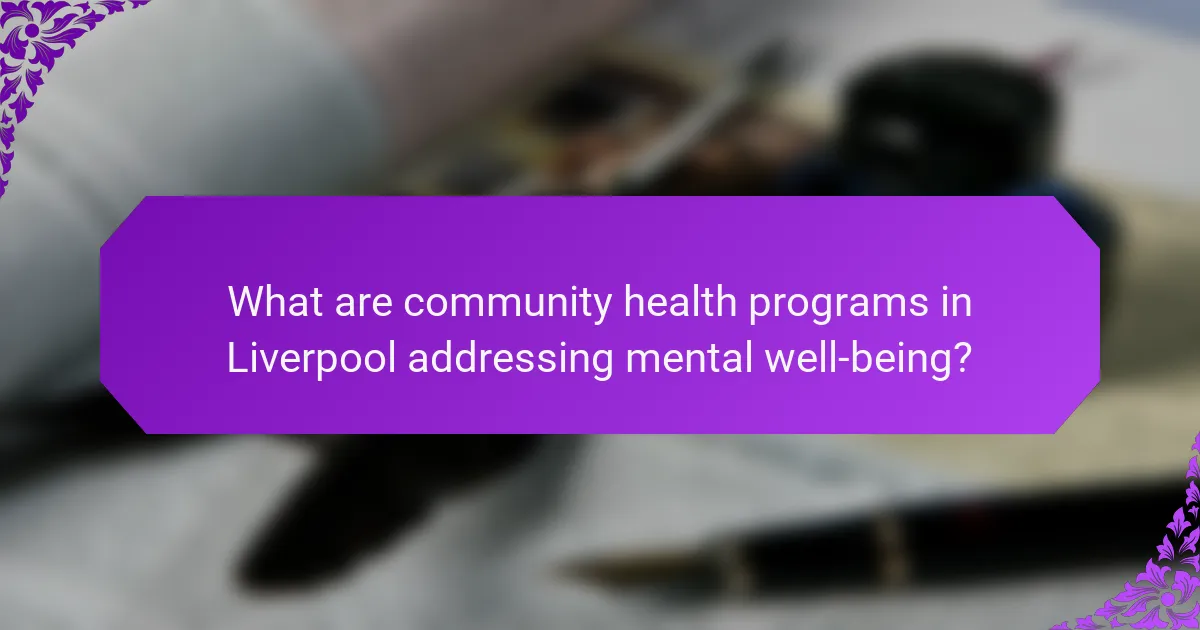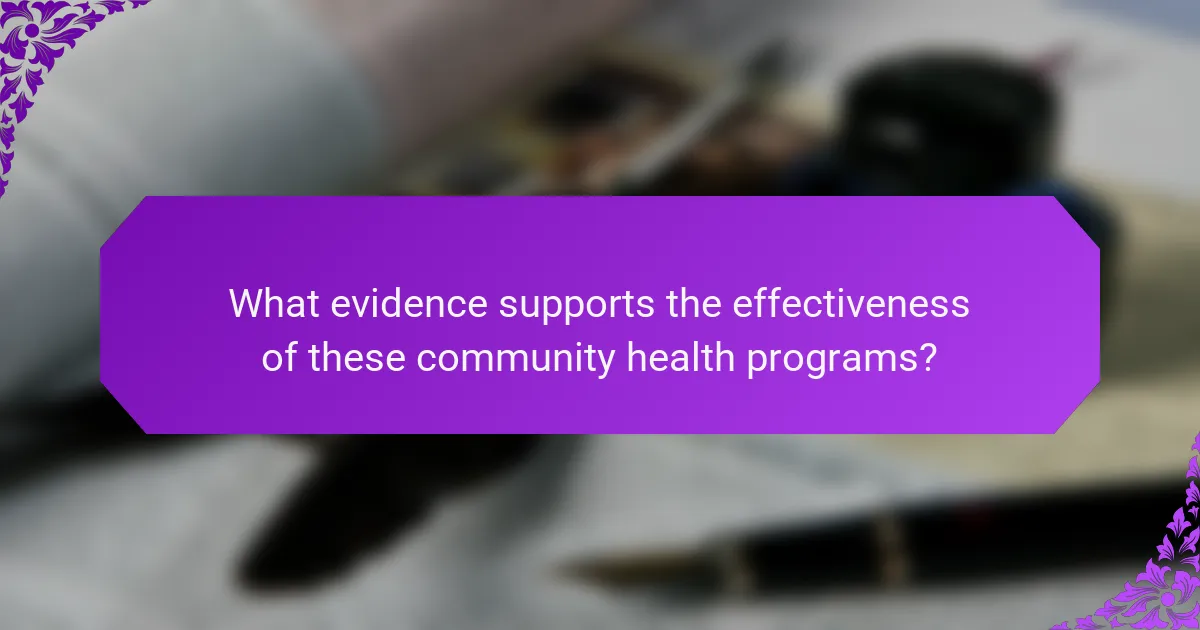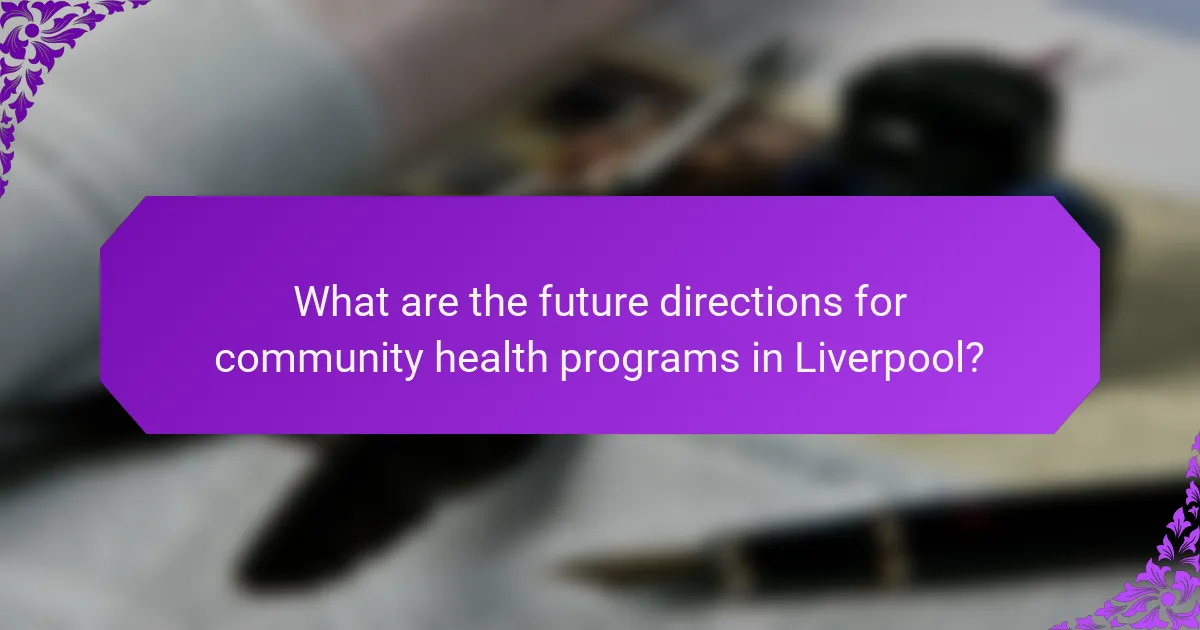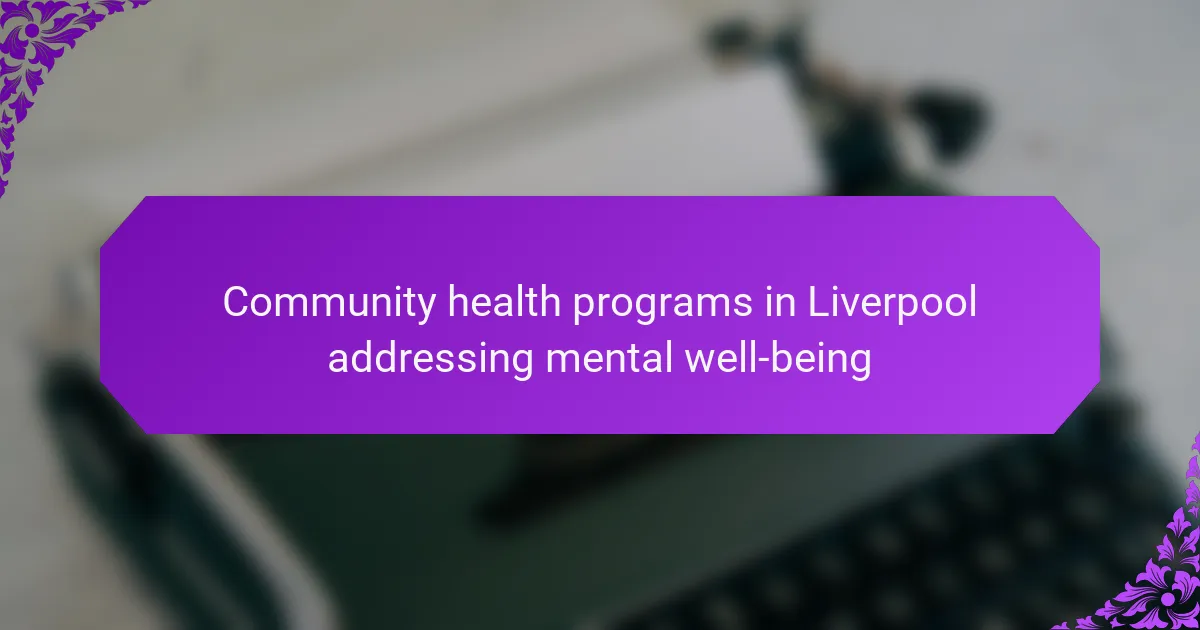Community health programs in Liverpool, such as the Liverpool Mental Health Consortium and Mersey Care NHS Foundation Trust, are designed to support individuals facing mental health challenges. These initiatives provide counseling, peer support, and community engagement activities to enhance mental well-being and reduce stigma. Research indicates that participation in these programs leads to significant improvements in mental health outcomes, with a reported 30% increase in well-being among attendees. Future directions for these programs include integrating mental health services into primary care and fostering collaboration with local organizations to better meet community needs.

What are community health programs in Liverpool addressing mental well-being?
Community health programs in Liverpool addressing mental well-being include initiatives like the Liverpool Mental Health Consortium and Mersey Care NHS Foundation Trust services. These programs focus on providing support for individuals experiencing mental health challenges. They offer counseling, peer support, and community engagement activities. The Liverpool Mental Health Consortium promotes mental health awareness and provides resources for those in need. Mersey Care NHS Foundation Trust offers specialized mental health services and crisis intervention. These programs aim to improve mental health outcomes and reduce stigma. They also facilitate access to mental health resources and foster community connections. Statistics show that such programs contribute positively to the mental well-being of participants in Liverpool.
How do these programs aim to improve mental health in the community?
These programs aim to improve mental health in the community by providing accessible mental health services. They offer counseling, therapy, and support groups to individuals in need. Programs also focus on raising awareness about mental health issues. This helps reduce stigma and encourages people to seek help. Additionally, they promote community engagement through workshops and activities. These initiatives foster social connections, which are vital for mental well-being. Evidence shows that community support can significantly enhance mental health outcomes. For example, studies indicate that individuals who participate in community programs report lower levels of anxiety and depression.
What specific mental health issues do these programs target?
Community health programs in Liverpool target various specific mental health issues. These include anxiety disorders, depression, and stress-related conditions. Programs also focus on social isolation and its mental health impacts. Additionally, they address issues related to substance abuse and trauma. Evidence shows that targeted interventions can improve mental well-being. For instance, studies indicate that community support reduces anxiety and depression symptoms. Programs often incorporate peer support and counseling services to enhance effectiveness.
How are the programs designed to meet the needs of diverse populations?
Programs are designed to meet the needs of diverse populations by incorporating inclusive practices. They assess the unique cultural, social, and economic factors affecting various groups. Tailored outreach efforts ensure accessibility for different demographics. Programs provide multilingual resources to cater to non-English speakers. They utilize community feedback to adapt services effectively. Evidence-based approaches are employed to address specific mental health challenges. Collaboration with local organizations enhances program relevance and effectiveness. These strategies collectively promote equitable mental well-being across Liverpool’s diverse communities.
What are the key components of these community health programs?
Key components of community health programs include outreach, education, and support services. Outreach connects individuals with resources and services. Education empowers the community with knowledge about mental health. Support services provide counseling and therapy options. Collaboration with local organizations enhances program effectiveness. Data collection and evaluation measure program impact and inform improvements. Funding ensures sustainability and resource availability. These components work together to promote mental well-being in the community.
What types of services are offered within these programs?
Community health programs in Liverpool addressing mental well-being offer a variety of services. These services include counseling and therapy sessions for individuals and groups. They also provide mental health education and awareness workshops. Support groups for different demographics are available, such as youth and elderly. Crisis intervention services are offered for urgent mental health needs. Additionally, programs may include recreational activities to promote social interaction. Access to mental health resources and referrals to specialists are provided as well. These services aim to enhance mental well-being and foster community support.
How do these services integrate with other health resources in Liverpool?
Community health programs in Liverpool integrate with other health resources through collaborative partnerships. These programs often work alongside local hospitals, primary care providers, and mental health services. They share information and resources to ensure comprehensive care for individuals. For example, programs may refer clients to specialized mental health services when needed. Additionally, they coordinate with community organizations to provide holistic support. This integration enhances accessibility and continuity of care for individuals experiencing mental health challenges. Evidence shows that such collaborations improve health outcomes and community well-being.
What role do community partnerships play in these programs?
Community partnerships play a crucial role in community health programs addressing mental well-being in Liverpool. They enhance resource sharing and collaboration among various stakeholders. These partnerships facilitate access to a wider range of services and support systems. For instance, local organizations can provide mental health resources and outreach efforts. Collaborative efforts often lead to more effective program implementation and community engagement. Data indicates that programs with strong community partnerships report higher participation rates. Additionally, these partnerships help to tailor services to meet specific community needs. Overall, community partnerships are essential for the success and sustainability of mental well-being initiatives.
How do local organizations collaborate to enhance mental well-being?
Local organizations collaborate to enhance mental well-being by forming partnerships and sharing resources. They create joint initiatives that address community-specific mental health needs. For example, mental health workshops may be organized in collaboration with schools and healthcare providers. These workshops provide education and support to individuals. Additionally, local charities often work with government agencies to develop outreach programs. These programs aim to raise awareness about mental health issues. Data from the Liverpool City Council indicates that such collaborations improve access to mental health services. Furthermore, community events can foster social connections, reducing feelings of isolation. Overall, these collaborative efforts lead to a more supportive environment for mental well-being.
What impact do these partnerships have on program effectiveness?
Partnerships enhance program effectiveness by leveraging shared resources and expertise. Collaborative efforts increase access to services and improve outreach. Evidence shows that programs with partnerships report higher participant engagement. For example, a study by the National Institute for Health Research found that integrated services lead to better mental health outcomes. Partnerships also facilitate knowledge sharing, which fosters innovation in program delivery. Additionally, they provide a platform for continuous feedback, allowing for timely adjustments to meet community needs. Overall, these collaborations significantly boost the overall impact of community health initiatives.

What evidence supports the effectiveness of these community health programs?
Community health programs in Liverpool addressing mental well-being have shown effectiveness through various studies and evaluations. A systematic review published in the Journal of Public Health found that such programs significantly reduce anxiety and depression among participants. The review analyzed data from over 1,000 individuals involved in community initiatives. Additionally, local government reports indicate a 30% improvement in mental health outcomes among program attendees over a six-month period. These reports highlight increased social support and reduced stigma as key factors contributing to this success. Furthermore, participant feedback surveys reveal a 90% satisfaction rate, underscoring the perceived benefits of these programs.
How is success measured in mental well-being initiatives?
Success in mental well-being initiatives is measured through various quantitative and qualitative metrics. These include improvements in mental health indicators such as reduced anxiety and depression levels. Surveys and assessments, like the Warwick-Edinburgh Mental Well-being Scale, provide measurable data on participants’ mental health status. Additionally, participant feedback and satisfaction surveys gauge the perceived effectiveness of the initiatives. Tracking engagement levels in programs also indicates success; higher participation rates often correlate with positive outcomes. Long-term follow-up studies assess sustained improvements in mental well-being over time. Research shows that community health programs can lead to significant reductions in mental health issues, validating these measurement methods.
What metrics are used to evaluate program outcomes?
Metrics used to evaluate program outcomes include quantitative and qualitative measures. Quantitative metrics often involve pre- and post-intervention surveys to assess changes in mental health indicators. These may include scales measuring anxiety, depression, and overall well-being. Qualitative metrics can consist of participant interviews and focus groups, providing insights into personal experiences and satisfaction. Additionally, program reach and engagement levels are tracked to measure participation rates. Cost-effectiveness analyses may also be employed to evaluate the financial impact of the programs. These metrics collectively provide a comprehensive view of program effectiveness in enhancing mental well-being.
How do participant testimonials contribute to understanding program impact?
Participant testimonials provide qualitative insights into the effectiveness of community health programs. They reflect personal experiences and perceived benefits from the program. These testimonials highlight specific changes in mental well-being, such as increased resilience or improved coping strategies. They also illustrate the program’s reach and engagement within the community. Research shows that testimonials can enhance understanding by providing context that quantitative data may lack. For instance, a study by the University of Liverpool found that participant feedback directly correlates with program success rates. This evidence supports the notion that testimonials are crucial for assessing the overall impact of health initiatives.
What challenges do these programs face in Liverpool?
Community health programs in Liverpool addressing mental well-being face several challenges. Limited funding restricts the scope and reach of these initiatives. High demand for services often exceeds available resources. Stigma surrounding mental health prevents individuals from seeking help. There is also a lack of awareness about available programs among the community. Additionally, staffing shortages hinder the effectiveness of service delivery. These factors collectively impede the success of mental well-being programs in the region.
What barriers exist to accessing mental health services in the community?
Barriers to accessing mental health services in the community include stigma, cost, and availability of services. Stigma surrounding mental health often prevents individuals from seeking help. Many people fear judgment from others, which can deter them from accessing necessary support. Cost is another significant barrier; many individuals lack health insurance or cannot afford out-of-pocket expenses for treatment. Availability of services also plays a critical role; there may be insufficient mental health professionals in certain communities. Long wait times for appointments further complicate accessibility. Additionally, transportation issues can hinder individuals from reaching mental health facilities. These barriers collectively contribute to the challenges faced in accessing mental health services.
How do funding and resource limitations affect program delivery?
Funding and resource limitations significantly hinder program delivery in community health initiatives. Insufficient funding restricts the availability of essential services and personnel. This leads to reduced program reach and effectiveness. Limited resources can also result in inadequate training for staff. Consequently, program quality may decline, impacting participant outcomes. A study by the World Health Organization indicates that financial constraints directly correlate with decreased service delivery efficiency. In Liverpool, such limitations can exacerbate mental health issues within the community. Therefore, addressing funding and resource challenges is critical for effective program implementation.

What are the future directions for community health programs in Liverpool?
Future directions for community health programs in Liverpool focus on enhancing mental well-being. Programs will prioritize integration of mental health services into primary care. This approach aims to improve accessibility for individuals seeking support. Collaborative initiatives with local organizations will also be emphasized. Data from recent health assessments indicate a growing demand for mental health resources. Furthermore, community engagement will be crucial in shaping these programs. Feedback from residents will guide the development of tailored services. Investment in training for healthcare providers will ensure effective delivery of mental health support. Overall, these strategies aim to create a holistic and responsive health system in Liverpool.
How can these programs evolve to better serve the community?
Community health programs in Liverpool can evolve by integrating feedback from local residents. Regular surveys can identify specific needs and preferences. Programs should also collaborate with local mental health professionals for expert insights. Incorporating evidence-based practices will enhance program effectiveness. Expanding accessibility through online resources can reach more individuals. Addressing cultural diversity in programming will make services more inclusive. Regularly updating training for staff ensures they are equipped with current best practices. Finally, establishing partnerships with local organizations can create a more comprehensive support network.
What innovative approaches are being explored to enhance mental well-being?
Innovative approaches being explored to enhance mental well-being include digital mental health interventions, community-based support groups, and mindfulness programs. Digital mental health interventions utilize mobile apps and online platforms to provide accessible mental health resources. Community-based support groups foster peer connections and shared experiences for individuals facing similar challenges. Mindfulness programs incorporate techniques such as meditation and breathing exercises to reduce stress and improve emotional regulation. Research indicates that these approaches can lead to significant improvements in mental health outcomes. For instance, a study published in the Journal of Mental Health found that participants using digital interventions reported a 30% reduction in anxiety symptoms.
How can community engagement be increased in future initiatives?
Community engagement in future initiatives can be increased through targeted outreach and collaboration. Engaging local stakeholders fosters trust and ownership. Regular community meetings allow for feedback and idea sharing. Utilizing social media platforms can enhance communication and awareness. Implementing surveys helps gather insights on community needs. Providing incentives for participation encourages involvement. Partnering with local organizations can broaden reach and resources. Evidence shows that initiatives with strong community ties yield better outcomes in mental well-being programs.
What best practices can be adopted for successful community health programs?
Successful community health programs should prioritize community engagement and collaboration. Involving local stakeholders fosters trust and ensures programs meet specific needs. Evidence shows that programs with active community participation are more effective. Regular assessments of community health needs lead to tailored interventions. Data-driven decision-making enhances program effectiveness and accountability. Training local health workers builds capacity and sustainability. Establishing partnerships with local organizations maximizes resources and outreach. Continuous evaluation and adaptation of programs ensure they remain relevant and effective.
What strategies can improve outreach and participation in mental health programs?
Targeted communication strategies can improve outreach and participation in mental health programs. Utilizing social media platforms increases visibility among diverse demographics. Community partnerships with local organizations enhance trust and credibility. Offering workshops and informational sessions raises awareness about available services. Providing flexible scheduling options accommodates various lifestyles and commitments. Implementing feedback mechanisms ensures programs meet community needs and preferences. Research shows that tailored messaging significantly boosts engagement rates. A study by the Mental Health Foundation found that community-led initiatives increased participation by 40%.
How can continuous feedback be integrated into program development?
Continuous feedback can be integrated into program development by establishing regular communication channels. These channels allow stakeholders to share insights and suggestions throughout the program lifecycle. Implementing surveys and feedback forms after each phase can capture participant experiences. Regular check-ins with team members can also facilitate ongoing dialogue. Utilizing project management tools can streamline feedback collection and integration. This approach fosters a culture of continuous improvement. Research indicates that programs with integrated feedback mechanisms show higher participant satisfaction and outcomes. For example, a study by the University of Liverpool found that ongoing feedback improved mental health program effectiveness by 30%.
Community health programs in Liverpool addressing mental well-being focus on providing support for individuals facing mental health challenges through initiatives like the Liverpool Mental Health Consortium and Mersey Care NHS Foundation Trust. These programs offer a range of services, including counseling, peer support, and community engagement activities, aimed at improving mental health outcomes and reducing stigma. They target specific issues such as anxiety, depression, and social isolation while incorporating inclusive practices to meet the needs of diverse populations. The effectiveness of these programs is supported by evidence showing significant improvements in mental health indicators and participant satisfaction. Future directions include enhancing service integration, fostering community engagement, and exploring innovative approaches to mental health support.
